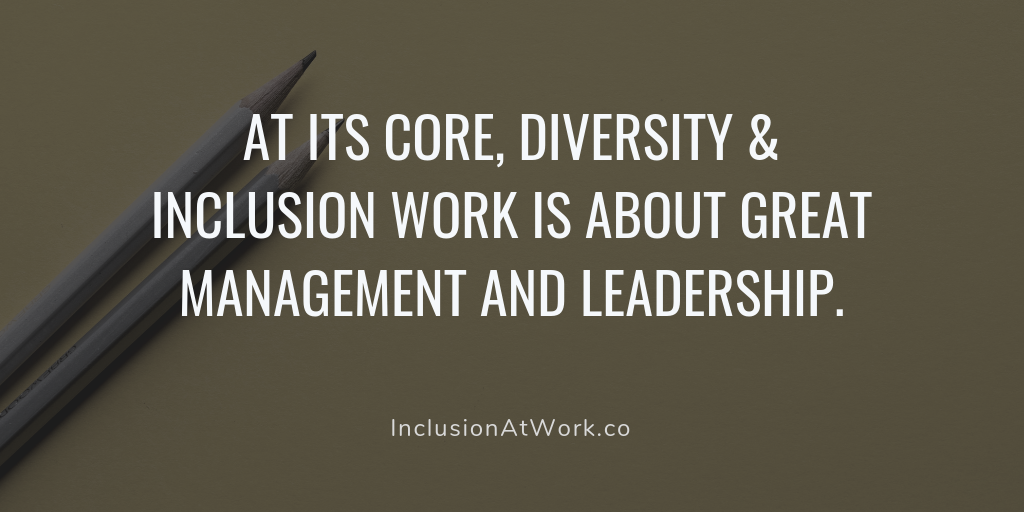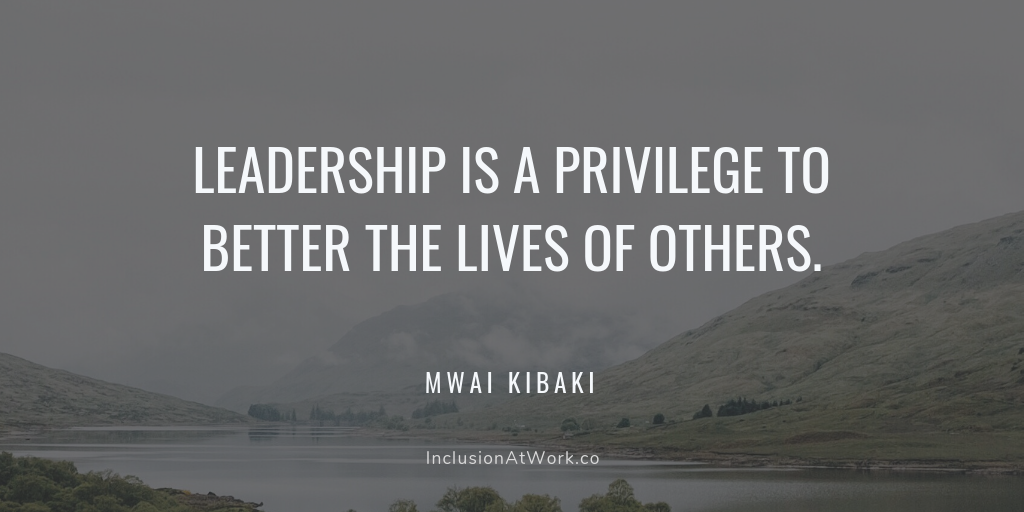Whose job is it to D&I anyway?
"How should startups reward / compensate internal D&I advocates?"

Submit your own question about Diversity & Inclusion here and subscribe to weekly posts here!
∗ ∗ ∗
Dear Inclusion At Work,
I am the executive sponsor of an ERG [employee resource group] at my company. Our ERGs are full of really passionate individuals who have gotten a lot of our D&I initiatives off the ground. They’ve helped a lot in moving the company in the right direction, which has been really appreciated by the rest of the team.
Recently, the ERG leads have started asking about getting compensated for their efforts. I floated it with the head of HR who’s not excited about the idea, and I’m also torn. On one hand, my company should of course support these employees. But I also understand HR’s concerns about the difficulty of appropriately assign dollar values to this and departing from our existing compensation policy. Any advice for rewarding D&I efforts?
-Empty Pockets Full Hearts
Dear Empty Pockets Full Hearts,
Before I answer your question, I want to provide some context via a useful concept called the “second shift.” It relates to the emotional labor that’s required to make any workplace run smoothly and effectively – taking care of others, picking up the “maintenance” tasks, paying attention to people’s emotional needs, etc.
While critical to the success of many businesses, most of this work is “invisible,” as in, hard to measure and see. Thus, emotional labor and those who are skilled at it are usually underappreciated and undervalued.
Much of D&I work is “second shift.” D&I at its core, is about making our workplaces more inclusive and successful for everyone, although we achieve that by paying attention to the experiences of marginalized groups. D&I benefits all of us – including the company’s bottom line – but it’s often seen as “soft” and thus, not valued as a legitimate business contribution.
Although D&I is everyone’s responsibility, I think it's management that should ultimately be held accountable, just as they are for hiring and performance goals. But our world isn’t there yet. So in the meantime, passionate volunteer advocates take on D&I on top of their regular jobs – hence the, unpaid “second shift.”
(Plus, it’s usually folks from marginalized groups who are putting in the time and effort for D&I, taking time away from their day jobs. That’s the frustrating irony; diversity work often reinforces the very disparity that it is supposed to remedy.)
That’s the context, now let’s get to some possible solutions. And below, I’ll separate out the short-term approaches from long-term.
Addressing the individual concerns
Empty Pockets Full Hearts, I think this is one of those cases where you need to dig a little deeper first. I encourage you to get curious about the unmet needs of your internal advocates, as there’s probably a story in there (or several). It may not be a comfortable conversation, and you may have to ask multiple times in different ways to get an honest dialogue going. Maybe someone received some negative feedback about their day job, and the additional D&I work isn’t being factored appropriately into considerations of their performance. Maybe they’re struggling with their manager and thinking about leaving, but feel as though a comp bump might be incentive enough to stay. Lots of possibilities. So, you have to get curious and ask.
For example, I once had an employee who started a vocal campaign for a bonus for their D&I involvement. Upon further investigation, it turned out they were recently denied a raise and thought it was unfair. We re-framed the issue, and once their manager provided more explanation and clarity around how to earn a raise, the employee dropped the matter.
In general, we should be careful about taking compensation-related requests at face-value, and that goes double for D&I. Without that Real Talk, you may not be able to address the real issue at hand, only react to symptoms.
Hacking reward and recognition for D&I
Appreciation, no matter how effusive or enthusiastic, doesn’t pay rent or feed families. We may not yet know how to design systems and rewards that will let people feel like valued contributors. But as an industry, it’s up to us to figure it out. Especially because from what I can tell, the numbers of "volunteer" D&I advocates are growing fast.
Doing this well will take time and social capital, so in the meantime we may have to get creative. It doesn’t have to be dollars, if we can create rewards/recognition outside of the formal compensation structure.
Here’s one approach that you might consider. At my last startup, I led the D&I Taskforce without a budget and definitely no bonuses. But it was important to me that individuals found the work to be meaningful and don’t end up feeling used by the company. In lieu of monetary compensation, I committed to investing in professional development for the Taskforce members, via 1:1 coaching and specific programs.
For example, I designed and ran a workshop on how to facilitate D&I sessions, which I now recommend to companies I advise. While the focus was on D&I, these skills learned in this session are broadly applicable to facilitating any kind of group – very much part of leadership.
Because at its core, D&I is about great management and leadership. It entails getting educated about the issues – for example, biases that hinder effective hiring. Or becoming aware of workplace dynamics to better designing team meetings with more intention, so you can leverage the full talents of your team. This kind of knowledge isn’t just relevant for D&I advocates, but every leader, period. Plus, investing in your internal D&I leaders is an extremely effective form of a leadership development program – one that has an added benefit of diversify your company’s leadership pipeline.

Designing a sustainable reward system
Finally, let’s take this opportunity to think about how we might solve for this challenge in a bigger, bolder way. Empty Pockets Full Hearts, trust me – this is a hard question there is no “best practice” for yet. That means you have the freedom to explore and experiment, and a chance to put forth something that not only helps your team, but our broader industry.
This is the question – If a company recognizes that D&I leads to better business outcomes (both on the people and the dollars) how could D&I champions be just as valued as top programmers or sales reps?
This is the perfect opportunity for you as an executive, to use the authority of your position and start a conversation. Gather relevant parties, including HR and other execs, in a room to talk about what it means to value this kind of work as a company – the “soft” skills, the hard-to-see, hard-to-measure second-shift work.
I understand that trying to start something from scratch can feel impossibly intimidating. But going into uncharted territory to do something important is emotionally brave work and exactly what we need more of. As an executive, you have so much more power in this area than you might realize. If you really care about diversity, don’t let unpaid, unrewarded labor be piled on marginalized people – your people.
And first step is simple – just starting a conversation. Keep an open mind, ask the questions, and be willing to learn and experiment. What are some ways to integrate D&I into OKRs? What would accountability look like? I know one company that has experimented with an “Employee Citizenship” category, which includes elements of D&I. What could we try for managers specifically? Maybe the company can sponsor leadership coaches for ERG leads?
Whatever you decide, ship it as a pilot to allow room for future adjustments. There will be a lot of ambiguity to work through. You don’t want to be stuck with a poorly-designed system that introduces more confusion and conflicts. But if you’re clear about your intentions and commitment for continuous improvement, it’ll be a huge signal to not only your D&I leads, but the entire company.
It’s not your responsibility to come up with The One Solution, but you can put out a stake that allows the rest of us to move forward. I hope you’ll give me updates so we can all learn from each other. That’s really the best part of D&I work. Wishing you the best of luck.
Yours,
Jen

Further Reading:
- A Rubric for Evaluating Team Members’ Contributions to an Inclusive Culture by Chelsea Troy
- Inclusion in the First Shift by Will Larson
👉 And check out our Diversity & Inclusion online course, created in partnership with Udemy!
Thanks to Bukky Adebayo for edits 💛
Image from Unsplash

